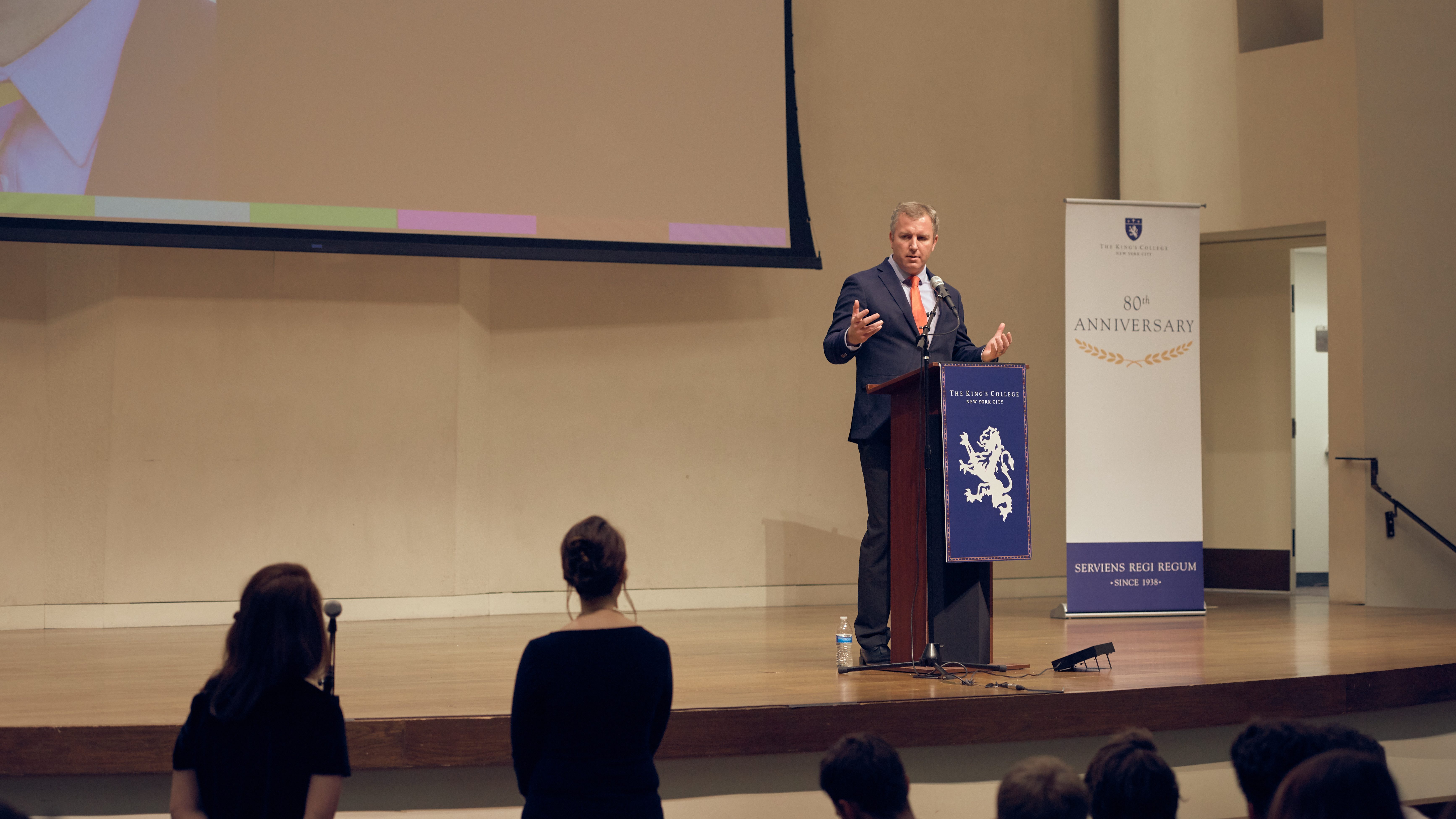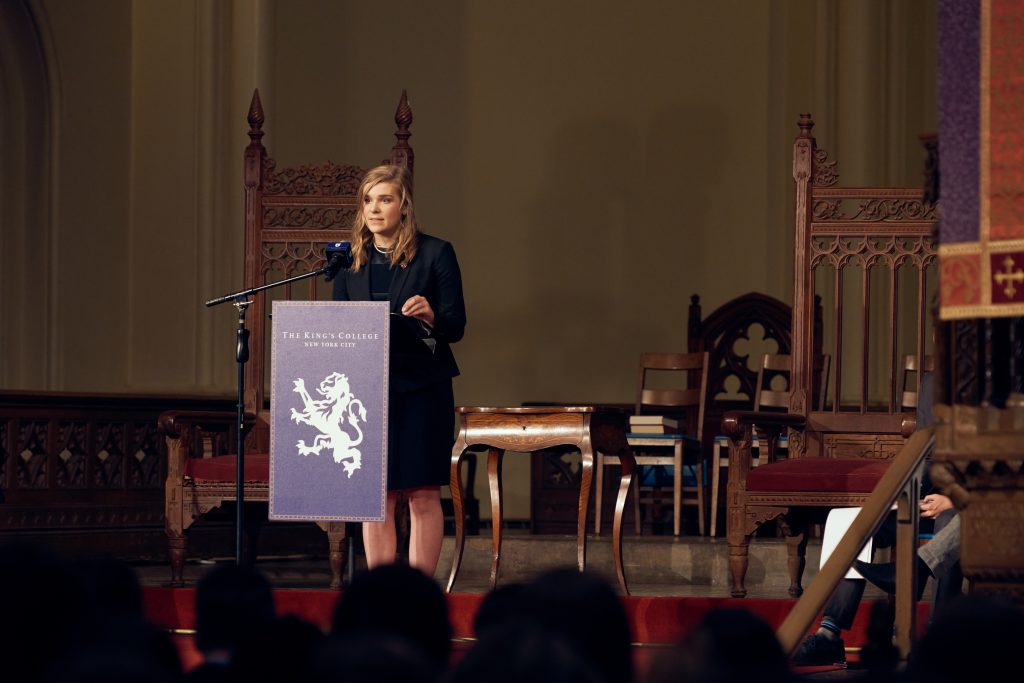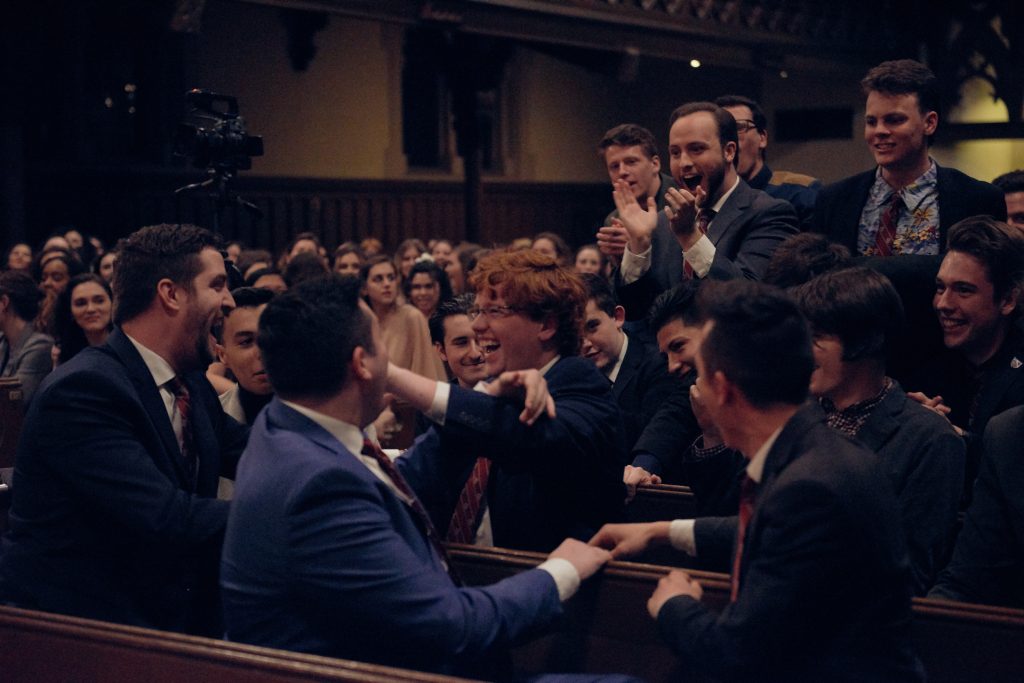Order & Chaos: Interregnum XV Prompts Conversations About Reconciliation Between the Earthly and the Divine
The King's College explored the themes of Order & Chaos during Interregnum XV, beginning with a lecture from Dr. David Corbin and concluding with a triumph for the Houses of C.S. Lewis and Susan B. Anthony.

On Tuesday, April 9, the entire student body of The King’s College filed into the sanctuary of Redeemer Presbyterian Church West Side for the annual Evening Lecture, the first event of Interregnum XV, the College’s three-day series of academic and artistic competitions designed to foster discussion about a philosophical theme. Dr. David Corbin, formerly a professor of politics at King’s and currently the vice president of academic affairs at Providence Christian College, inaugurated the discussion of this year’s theme, Order & Chaos.
Corbin discussed Order & Chaos as understood by Judeo-Christian theology as well as the Greek theogony. These classical beliefs about the fallen state of man, or, conversely, the golden age of man, demonstrate man’s tendency to emulate the gods in order to mediate the separation of the earthly from the divine. Men have always struggled to identify their role in the world, Corbin said, but they have all understood that this world is not in a state of peace. Few of us possess the wisdom to order our own souls, let alone cities, so we often employ artifice to mediate the chaos in our souls as well as in the world. While sometimes God instructs us to use artifice, such as the Temple and the Ark of the Covenant, “Attempts to restore peace through the flesh and word alone will always fall apart,” Corbin said. We construct things in vain that do not withstand the test of time, and, to paraphrase Augustine, we have failed to find peace through the word because we follow in the footsteps of Cain. Therefore, we require an ultimate mediator to restore us to order. The good news, Corbin said, is that the gift of Christ is the gift of peace.
In such a disordered world, Corbin said, it can be tempting to be enveloped by chaos or to try to escape from it. “But is there something else that can be done?” he asked.
What would it mean to mediate word and flesh in our day? It’s not an easy question. I don’t have a final answer tonight on April 9, 2019, but the beginning of an answer. Mediation requires communion with others, and that can only happen in the word and flesh if we are willing to be with one another in speech and in our actions. This will not mean abandoning human artifice or thinking human nature something it’s not, but rather thinking human nature capable of something it is—namely, we can be with one another. We can live a life of withness with one another. We can be agents of mediation. We can be agents of communion. Drawing our words and flesh to the flesh-made Word, we recover a proper orientation to order and chaos, but most importantly, peace. Remember, blessed are the peacemakers, for they shall be called the children of God.
I trust that the Interregnum Committee chose the theme of Order & Chaos because they thought it conducive to a lively and civil debate that might encourage something that is in short supply these days, namely peace. It’s not easy to explore difficult themes or ask hard questions, but higher education can only be higher if it enables us to wrestle with controversy.
Corbin’s charge to wrestle with difficult questions as we pursue peace animated discussions for the remainder of the week, which featured performing arts competitions, writing contests, and rhetorical exercises. Wednesday featured four rounds of parliamentary debate, a three-hour art competition, and an open mic night during which students explored division within the church, government imposition of moral standards, and Thomas Cole’s series of paintings The Course of Empire, among other staples of academic discourse. On Thursday, students submitted creative and academic writing samples based on works by C.S. Lewis, Cicero, and Cornelius Plantinga. Random theme debate, an improvisational rhetorical contest and one of the wackier events of the week, concluded Thursday’s events, with Jon Adler (MCA ’19) taking first place for the House of C.S. Lewis. The remaining events on Friday, reenactments of great historical speeches from George Washington to Aleksandr Solzhenitsyn, and a performing arts competition based on the confrontation of inner darkness, were followed by the final parliamentary debate and award ceremony at St. George’s Episcopal Church.

Catie Shoemaker (RTS ’20) and Jillian Cheney (JCS ’19) of the House of Susan B. Anthony represented the government’s motion in the final debate, making the case that “The primary aim of education should be the development of intellectual and moral character.” Kyle Kendrick (RTS ’19) and Jared Neikerk (PPE ’19) of the House of Lewis opposed the motion, arguing that institutions of higher learning ought to foster intellectual development while it is the responsibility of the church and family to shape character and morality. The House of Susan B. Anthony triumphed, winning the final debate and taking second place in both Interregnum XV and the year-long competition for the House Cup. Conversely, the House of Lewis took second place in parliamentary debate, debate, but won first place in both Interregnum XV and the House Cup.

Another factor of in this year’s Interregnum was the first 24-hour filmmaking competition, which replaced the reading test last fall. Houses had one day to write, produce, and evaluate a short film based on this year’s required texts, Macbeth and the Book of Ecclesiastes. The film screening was contextualized by discussions of the reading material led by Rev. Dr. Dru Johnson, associate professor of biblical and theological studies, and Dr. Ethan Campbell, associate professor of English and literature. Associate Professor of English and Humanities Alissa Wilkinson also held a talk on film criticism before the screenings. The House of Queen Elizabeth I took first place for the film competition, which was factored into the final score of the Interregnum spring competitions.
Echoing Corbin’s encouragement of scholarly discourse, Dr. Joshua Blander, assistant professor of philosophy and faculty advisor to the Interregnum Committee, concluded, “Interregnum provides our student body with a unique opportunity for social and academic unity. It encourages a time of joyful engagement with one another in an academic enterprise, which prepares them for the kind of healthy social engagement around significant ideas that we hope they can achieve even after graduation. This year’s theme, Order & Chaos, was especially apt for encouraging our community to reflect on what enables us to live well.”




